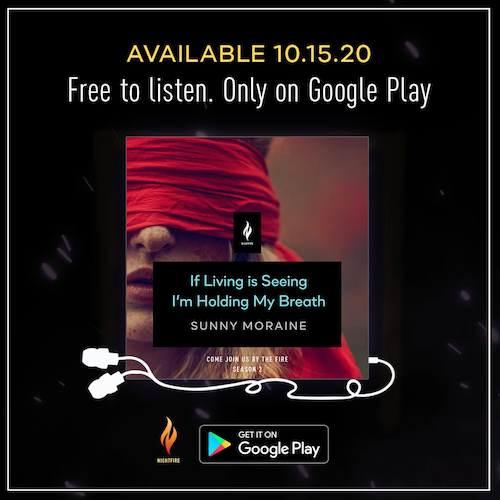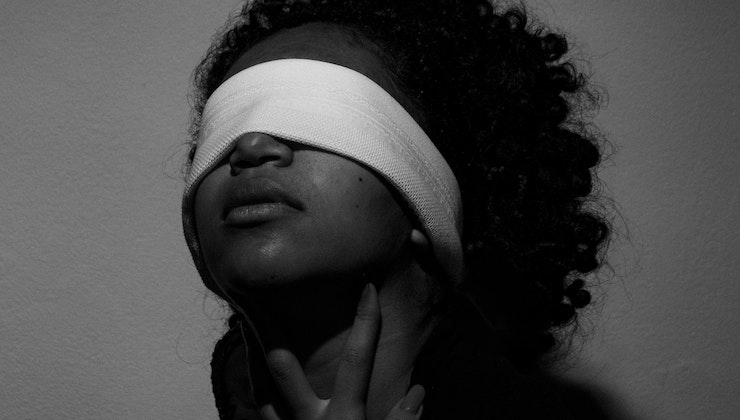sample heading
To celebrate the release of the second season of Come Join Us By The Fire, our audio horror anthology, we’ve asked authors with stories included in this year’s anthology to join us and write about horror. Below, Sunny Moraine, whose story “If Living is Seeing, I’m Holding My Breath” you can listen to here, writes about the paradox of our need for face-to-face contact.
When living through a strange and difficult time, writers are always faced with a strange and difficult question: Do we try to work directly through what’s going on? Or do we focus on escapism?
And is it possible to do both?
I think the answer is always going to radically depend on the writer. We’re all possessed of a unique psychology and we all react differently to our circumstances. No two experiences of the ongoing pandemic and associated social breakdown have been exactly alike, although for many of us, our experiences fall along common themes. Some of us will find ourselves coping by immersing ourselves in current events, potentially to an unhealthy degree (stop doomscrolling, stop it right now). Some of us will run as far away from everything as possible, as fast as possible. And then some of us will alternate between them. We all do the best we can.
When you write for an audience, it can be tempting to try to guess what that audience is going to want to read. But that’s a false route which I find tends to end in bad work. Do people want to read stories about COVID-19? Some people do and some people don’t; really what matters is whether or not I want to write those stories.
What I should also say is that I’m frequently uncertain how to distinguish between want to and have to.
When I was offered the chance to write a story for the second season of Come Join Us By the Fire, I don’t recall there being much internal deliberation regarding whether or not I was going to write a pandemic story. It simply seemed to follow—again, not because I imagined that someone would want to read it, but because I felt that I needed to write it. Escapism just felt wrong. But the thing about writing a story that addresses what’s happening for us right now is that you can’t approach it head-on—or in my experience it’s usually better not to try. Rather, you have to sidle up to it and try to catch it unawares. Write a story about something that never happened and is not happening now, but which is nevertheless viscerally recognizable.
What are some of the common themes of our lives in 2020? Isolation. Uncertainty. Fear. Anger and frustration. Perhaps most weirdly, the problems inherent to the task of figuring out how to be with each other when we can no longer be with each other. I work from home in a somewhat secluded house in the suburbs and I have no friends within walking distance, while my spouse works in an office; I tend to spend a lot of time alone anyway. You’d think that I’d be handling quarantine fairly well. But I’m not; as the weeks since I went into lockdown in March have gone by, I’ve found myself increasingly desperate to make contact with people, and non-meatspace interaction just doesn’t cut it.
All the conventions where I see friends and professional associates? Canceled, with no clear idea when they’ll happen next—maybe by spring 2021 things will be better, but they could very well not be. My mother is sixteen hundred miles away caring for her elderly father. My own father has a heart condition and is therefore high-risk from COVID; I haven’t seen him since last Christmas. I haven’t seen my sister (who lives in New York City). I haven’t seen my spouse’s family, who I really enjoy being with.
I haven’t seen anyone, not for any extended length of time, except the guy who came to fix our garbage disposal. And it’s far more miserable than I ever would have expected.

But it isn’t even just about missing people and not knowing when I’ll see them again. It’s the fact that every in-person interaction is now a source of anxiety. Is this person infected? I can’t know that. Are they wearing a mask? Am I able to stay at least six feet apart from them? Even going hiking—in the knowledge that being outside is relatively safe, especially with a mask—can be a little nerve-wracking. There are ways to reduce the risk, but the risk is never completely gone.
Life is risky anyway, but never before have I had to view everyone around me as potentially dangerous like I do now.
Physical contact is also a component of this. I can be in proximity to people, but touching is basically out of the question. For half a year, I haven’t been hugged or even touched by anyone other than my spouse. It’s simply not worth the risk.
What does that do to you? What does that do to how you are with and around people?
I felt like that’s what I needed to attempt to tell a story about: when not only do you have to be isolated, but interpersonal contact in and of itself becomes a threat to your health and even your life—and in my story, your sanity. Where sliding your eyes to the wrong place even for a second can result in two brutal deaths, if not more.
Not all those of us who are sighted crave eye contact. Some of us prefer to avoid it. But for a tremendous number of us, it’s a source of powerful connection and even intimacy. It is, in its way, another kind of touch. So what’s a world in which that’s no longer possible, where we can’t know someone else in that sense? Where we can’t even look at someone’s entire face, because—again—the risk to yourself and to them is too great.
So in my story, we all live in a world without each other’s eyes, without each other’s faces. And what I ended up writing about is what happens when the need for both those things—the very need to connect on that level—becomes too intense and too terrible to resist any longer, even for someone who believed she had successfully shed the need for any real contact at all.
I should note that a world like the one I’m writing opens up a number of questions regarding the different kinds of people who have to make their lives in it. I’m focusing on two sighted people who do want that sort of contact; clearly a blind person’s experience of this world would be very distinct, as would the experience of someone who finds eye contact extremely uncomfortable and prefers to avoid it entirely. For the purposes of this particular story, I’m neglecting an exploration of those other experiences. But I want us to think about them regardless, obviously because those lives and experiences and stories are just as important, but also because—like I said above—we’re all processing this so differently, and those differences are important as well. To some degree they are who we are.
On its face, this isn’t a story about the pandemic. It might have been written at any time. But it is about the pandemic, in every meaningful sense, and I think, for when I was writing, it’s the story I had to write.
Sunny Moraine’s short fiction has appeared in Clarkesworld, Strange Horizons, Nightmare, Lightspeed, and multiple Year’s Best anthologies, among other places. They are also responsible for the Root Code and Casting the Bones trilogies and their debut short fiction collection Singing With All My Skin and Bone is available from Undertow Publications.
Listen to Sunny’s story “If Living is Seeing, I’m Holding My Breath” on Google Play here, and listen the the entirety of the second season of Come Join Us By The Fire here.



